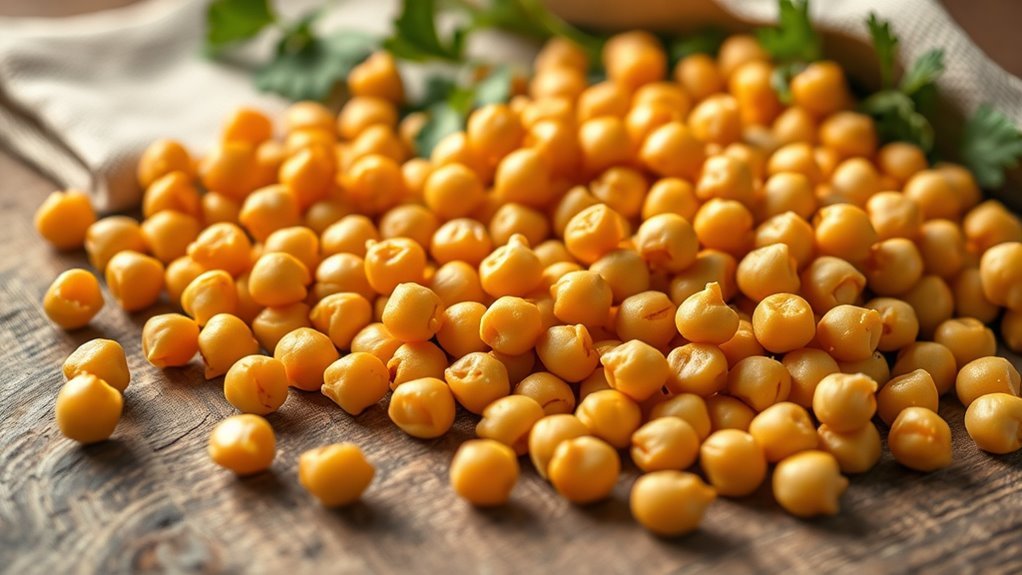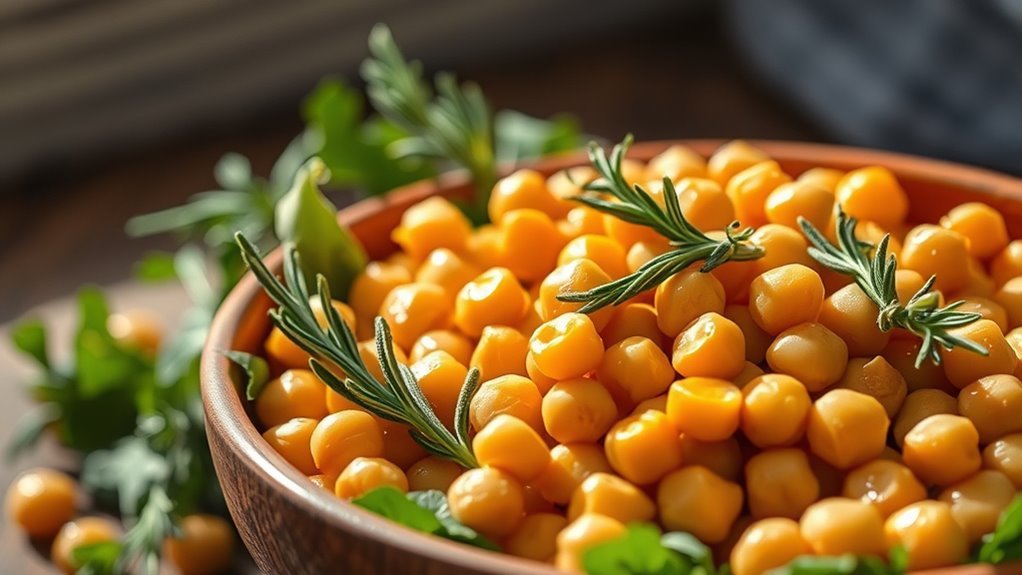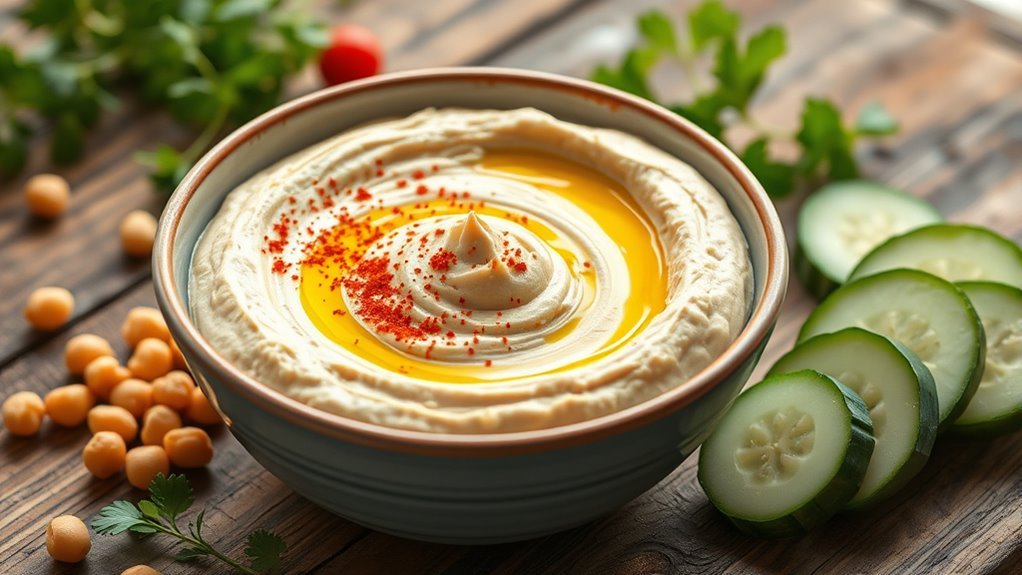Chickpeas aren’t considered keto-friendly because they contain about 45 grams of carbohydrates per cup, surpassing typical keto limits. While they’re rich in protein and fiber, this high carb content can impact ketosis and blood sugar levels. If you’re following a strict low-carb diet, you might want to explore alternatives like cauliflower or zucchini for your meals. If you’re curious about other options and their health benefits, there’s more to discover.
Nutritional Profile of Chickpeas

Chickpeas, also known as garbanzo beans, are a nutritious legume that provide a wealth of health benefits. They come in various chickpea varieties, such as the popular Kabuli and the smaller, darker Desi. Each type offers unique flavors and textures, making them versatile for numerous dishes. A standard serving of chickpeas contains protein, fiber, vitamins, and minerals, which can help support your overall health. For serving suggestions, you might enjoy them in salads, stews, or blended into hummus. Incorporating chickpeas into your diet can enhance your meals while providing essential nutrients. By exploring these options, you can enjoy the delicious ways chickpeas can fit into your lifestyle, bringing both satisfaction and wellness to your table.
Carbohydrate Content and Its Impact on Keto

While chickpeas are rich in essential nutrients, their carbohydrate content may pose a challenge for those following a ketogenic diet. Here’s what you should know about their impact on your keto journey:
- Net Carbs: One cup of chickpeas contains about 45 grams of carbohydrates, which exceeds typical keto guidelines.
- Keto Limits: Most keto plans recommend staying under 20-50 grams of net carbs daily.
- Blood Sugar: High carb intake could affect your blood sugar levels, hindering ketosis.
- Chickpea Alternatives: Consider options like cauliflower rice or zucchini noodles to keep your carb count low.
Ultimately, if you’re committed to keto, exploring chickpea alternatives might be your best bet for staying on track without sacrificing flavor.
Health Benefits of Chickpeas

When you incorporate chickpeas into your diet, you gain access to a variety of health benefits that can support overall wellness. These legumes are packed with essential nutrients, including protein, fiber, vitamins, and minerals, which contribute to heart health and digestive function. One of the notable chickpea benefits is their ability to help regulate blood sugar levels, making them a great option if you’re looking to maintain energy throughout the day. Additionally, chickpeas possess anti-inflammatory health properties, which can support your immune system. Their high fiber content promotes satiety, aiding in weight management. Overall, including chickpeas in your meals can enhance nutrition while offering numerous health advantages that align with a balanced lifestyle.
How Chickpeas Fit Into a Low-Carb Diet
When considering chickpeas on a low-carb diet, it is crucial to look at their nutritional profile and carb content. While they offer valuable protein and fiber, their carbohydrate count can impact your daily intake. Understanding these factors will help you determine how chickpeas might fit into your meal plan.
Nutritional Profile Overview
Though chickpeas are widely celebrated for their health benefits, their fit within a low-carb diet can be a bit complex. Here’s a quick overview of chickpeas’ nutritional profile:
- Protein Sources: Chickpeas are rich in protein, making them a popular choice for plant-based diets.
- Chickpea Varieties: Different varieties, like garbanzo beans, offer unique nutritional benefits, though they generally share similar carb content.
- Fiber Content: They’re high in fiber, which can aid digestion and promote satiety.
- Nutrient Density: Packed with vitamins and minerals, chickpeas can be a valuable addition to balanced meals.
While you might enjoy the health perks of chickpeas, it’s crucial to take into account their carb content in the context of your low-carb diet goals.
Carb Content Analysis
Chickpeas are often celebrated for their nutritional benefits, but their carbohydrate content can be a concern for those following a low-carb diet. On average, a cup of cooked chickpeas contains about 45 grams of carbohydrates, which might not fit into strict keto guidelines. However, different chickpea varieties can yield varying carb counts; for instance, canned chickpeas generally have fewer carbs than dried ones due to their cooking methods. If you’re looking to include chickpeas in your meals, consider moderation and combine them with low-carb ingredients to balance your intake. Ultimately, while chickpeas can be a nutritious choice, their carb content requires careful consideration in a low-carb lifestyle. Enjoying them occasionally might still align with your dietary freedom.
Alternatives to Chickpeas for Keto-Friendly Meals
What do you do when you’re craving the hearty texture and protein punch of chickpeas but want to stick to a keto diet? Fortunately, there are several keto-friendly alternatives that can serve as effective legume alternatives. Consider these keto substitutions for your next meal:
- Cauliflower – Use it in salads or as a rice substitute for a satisfying texture.
- Green Beans – These are low in carbs and packed with nutrients; perfect for stir-fries.
- Zucchini – Spiralize it for noodles or dice it into soups for added volume.
- Mushrooms – They offer a meaty texture and are great in stews or as a base for sauces.
These options can help you enjoy hearty meals while staying true to your keto goals.
Portion Control and Moderation
Finding suitable substitutes for chickpeas can help satisfy cravings while adhering to a keto diet, but it’s just as important to focus on portion control and moderation. Even keto-friendly foods can impact your carb intake if you don’t keep an eye on portion sizes. Practicing mindful eating allows you to enjoy your meals while remaining aware of how much you’re consuming. By being conscious of your portions, you can still indulge in tasty alternatives without derailing your diet. Remember, it’s not just about what you eat, but how much you eat. Finding that balance between enjoyment and moderation can empower you to maintain your keto journey more effectively, giving you the freedom to savor every bite.
Recipes Incorporating Chickpeas for a Balanced Approach
While it might seem challenging to incorporate chickpeas into a keto diet, there are creative ways to enjoy their unique flavor and nutritional benefits without compromising your carb goals. Here are some balanced recipes to try:
- Chickpea Salad: Mix chickpeas with cucumbers, tomatoes, and a light vinaigrette for a revitalizing dish.
- Roasted Chickpeas: Toss chickpeas in olive oil and spices, roast until crispy for a satisfying snack.
- Chickpea Flour Pancakes: Use chickpea flour to make low-carb pancakes, great for breakfast or brunch.
- Chickpea Stir-Fry: Combine chickpeas with non-starchy vegetables and your favorite protein for a hearty meal.
Frequently Asked Questions
Can Chickpeas Cause Weight Gain on a Keto Diet?
Chickpeas can contribute to weight gain on a keto diet if not eaten in moderation. A study shows that portion control is essential; consuming just one cup of chickpeas can add around 45 grams of carbs. Instead, consider keto-friendly alternatives like cauliflower or zucchini. By keeping chickpea portions in check, you can enjoy their benefits without derailing your diet. Balance is key to achieving your health goals while feeling free in your choices.
Are Canned Chickpeas as Nutritious as Dried Ones?
Canned chickpeas can be just as nutritious as dried ones, but it often depends on preparation methods. While canned varieties are convenient and retain many nutrients, they might contain added sodium. In a nutritional comparison, dried chickpeas usually offer a fresher taste and potentially higher nutrient density when cooked properly. If you’re watching your sodium intake, rinsing canned chickpeas can help. Both options can fit into a balanced diet, so choose what works for you.
How Do Chickpeas Affect Blood Sugar Levels?
Chickpeas can positively impact blood sugar levels. In fact, studies show they have a low glycemic index, with a glycemic load of just 10 per serving. This means they help maintain steady blood sugar levels, reducing spikes that can lead to cravings. By incorporating chickpeas into your meals, you’re not just enjoying a nutritious food; you’re also making a smart choice for your blood sugar management and overall health.
Are There Any Allergens Associated With Chickpeas?
Yes, there are allergens associated with chickpeas, particularly for those with chickpea allergies. Symptoms can range from mild to severe and may include hives, swelling, or even anaphylaxis in extreme cases. It’s important to note that chickpeas are naturally gluten-free, making them a safe option for individuals with gluten sensitivity. If you suspect you have a chickpea allergy, it’s best to consult a healthcare professional for proper diagnosis and guidance.
Can Chickpeas Be Consumed Raw or Sprouted?
You can consume raw chickpeas or sprouted ones, but it’s important to tread carefully. Raw chickpeas contain antinutrients that can hinder digestion. Sprouting them, however, brings forth benefits like increased nutrient availability and improved digestibility. Think of sprouted chickpeas as little powerhouses, transforming the ordinary into the extraordinary. Just remember to soak them properly to reduce those pesky antinutrients and enhance their health benefits. Enjoy the freedom of nutritious choices!
Frequently Asked Questions about Chickpeas and Keto Diet
1. Are chickpeas considered keto-friendly?
Chickpeas are generally not considered keto-friendly due to their relatively high carbohydrate content. A typical serving of chickpeas (about 1 cup) contains approximately 45 grams of carbohydrates, which can significantly exceed the daily carb limit for those following a strict ketogenic diet. While they do offer nutritional benefits, such as protein and fiber, their carb content makes them less suitable for a keto meal plan.
2. What is the carbohydrate content of chickpeas?
Chickpeas are high in carbohydrates, with about 45 grams of carbs per cooked cup. This includes around 12 grams of fiber, which can be subtracted from the total carb count for net carbs. However, even when accounting for fiber, chickpeas still provide around 33 grams of net carbs per cup, making them unsuitable for most ketogenic diets that typically limit net carbs to around 20-50 grams per day.
3. Can chickpeas be included in a low-carb diet?
Chickpeas can be included in a low-carb diet, but moderation is key. While they are not ideal for a strict keto diet, they can fit into a more relaxed low-carb plan. If you have a daily carb limit of 100 grams or more, small portions of chickpeas may be manageable. It’s important to monitor your overall carb intake and adjust accordingly to maintain your dietary goals.
4. What are some alternatives to chickpeas for a keto diet?
For those following a keto diet, alternatives to chickpeas include low-carb vegetables such as cauliflower, zucchini, and spinach. Additionally, nuts and seeds, like almonds or chia seeds, can provide healthy fats and protein without the high carbohydrate content. For a similar texture in recipes, you might consider using mashed cauliflower as a base or creating dishes with shredded cabbage or konjac noodles.
5. Are there any health benefits to eating chickpeas?
Yes, chickpeas offer several health benefits. They are an excellent source of plant-based protein, dietary fiber, and essential vitamins and minerals such as folate, iron, and magnesium. Their high fiber content supports digestive health and can help regulate blood sugar levels. While they may not fit into a strict keto diet, incorporating chickpeas into a balanced diet can contribute to overall health and well-being.
References
- https://www.healthline.com/nutrition/chickpeas-keto
- https://www.ncbi.nlm.nih.gov/pmc/articles/PMC6681804/
- https://www.medicalnewstoday.com/articles/322834
- https://www.dietitians.ca/Downloads/Public/Fact-Sheet-Chickpeas.aspx
- https://www.hsph.harvard.edu/nutritionsource/food-features/chickpeas/
- https://www.eatright.org/food/nutrition/dietary-guidelines-and-myplate/chickpeas-and-the-keto-diet


